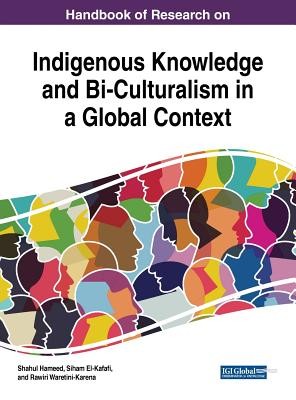
- We will send in 10–14 business days.
- Publisher: Information Science Reference
- Year: 2018
- Pages: 400
- ISBN-10: 1522560610
- ISBN-13: 9781522560616
- Format: 21.6 x 27.9 x 2.4 cm, hardcover
- Language: English
- SAVE -10% with code: EXTRA
Handbook of Research on Indigenous Knowledge and Bi-Culturalism in a Global Context (e-book) (used book) | bookbook.eu
Reviews
Description
Society is continually moving towards global interaction, and nations often contain citizens of numerous cultures and backgrounds. Bi-culturalism incorporates a higher degree of social inclusion in an effort to bring about social justice and change, and it may prove to be an alternative to the existing dogma of mainstream Europe-based hegemonic bodies of knowledge. The Handbook of Research on Indigenous Knowledge and Bi-Culturalism in a Global Context is a collection of innovative studies on the nature of indigenous bodies' knowledge that incorporates the sacred or spiritual influence across various countries following World War II, while exploring the difficulties faced as society immerses itself in bi-culturalism. While highlighting topics including bi-cultural teaching, Africology, and education empowerment, this book is ideally designed for academicians, urban planners, sociologists, anthropologists, researchers, and professionals seeking current research on validating the growth of indigenous thinking and ideas.
EXTRA 10 % discount with code: EXTRA
The promotion ends in 15d.02:22:53
The discount code is valid when purchasing from 10 €. Discounts do not stack.
- Publisher: Information Science Reference
- Year: 2018
- Pages: 400
- ISBN-10: 1522560610
- ISBN-13: 9781522560616
- Format: 21.6 x 27.9 x 2.4 cm, hardcover
- Language: English English
Society is continually moving towards global interaction, and nations often contain citizens of numerous cultures and backgrounds. Bi-culturalism incorporates a higher degree of social inclusion in an effort to bring about social justice and change, and it may prove to be an alternative to the existing dogma of mainstream Europe-based hegemonic bodies of knowledge. The Handbook of Research on Indigenous Knowledge and Bi-Culturalism in a Global Context is a collection of innovative studies on the nature of indigenous bodies' knowledge that incorporates the sacred or spiritual influence across various countries following World War II, while exploring the difficulties faced as society immerses itself in bi-culturalism. While highlighting topics including bi-cultural teaching, Africology, and education empowerment, this book is ideally designed for academicians, urban planners, sociologists, anthropologists, researchers, and professionals seeking current research on validating the growth of indigenous thinking and ideas.


Reviews